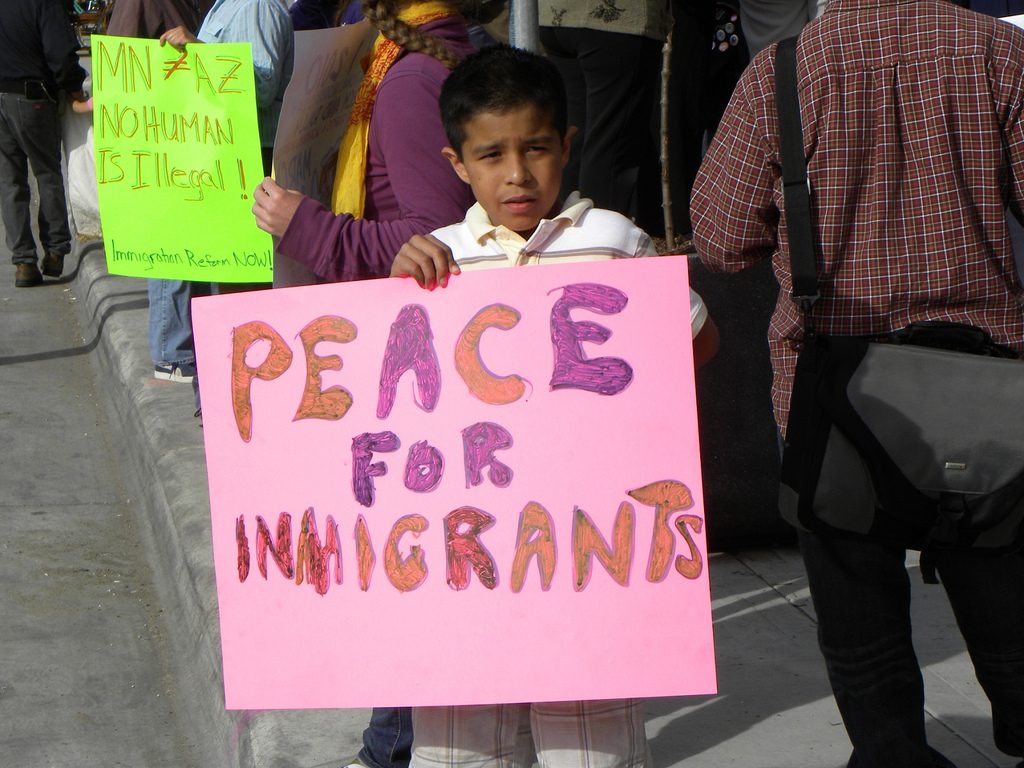News > Immigration In The United States
Changes to Public Charge Rule: Background (Last updated 11/8/2018)
Posted on Nov 08 2018
This document was last updated in November, 2018. For current background information on public charge, click here.
On October 10, the Trump administration introduced an administrative rule change that seeks to limit the number of people allowed to obtain immigration benefits or enter the United States based on their health, age, and financial resources. The proposed rule change, “Inadmissibility on Public Charge Grounds,” which will take effect after the government considers comments it receives during a 60-day public comment period, will be the most radical change to immigration law and the use of public benefits by immigrants in 22 years. If enacted, the rule will have a devastating impact on low-income and working-class immigrant families and their US citizen children, many of whom will face the difficult choice between jeopardizing their family’s immigration status or refusing assistance to ensure their children’s food, housing, and medical care.
Click here for information on how you can say something about this change.
Click here for much more information and a list of documents relating to public charge regulation.
The “public charge” rule has had a narrow application. Currently, the government can deny immigration status to persons who it deems may become dependent on three cash-based assistance programs: TANF, SSI or long-term institutional care such as Medicaid coverage for nursing home care.
The current public charge test affects approximately 3 percent of family-based visa and green card applicants. The new proposal would widen the scope of eligible public assistance programs to include many more forms of public assistance and would give government officials wide discretion with little accountability on how to apply the test. The Department of Homeland Security estimates that the new rule change will affect approximately 382,000 family-based immigrants per year.
In 1999, the Immigration Service clarified that only a few cash-based public assistance programs could lead to a finding of public charge. Now, the Trump administration has published its proposed rule change prior to the mid-term elections to support the false narrative that immigrants rely on public assistance more than native-born citizens. That is not true. This attempt at garnering electoral support from anti-immigrant rhetoric, will have real, devastating and long-lasting consequences for immigrant families, and for all of us, long after the election is over. Among the direct consequences:
- The proposed rule change will undermine public health. The proposed changes, which attempt to punish immigrants, will affect entire families, including U.S. citizen children. If a mother refuses to sign her family up (or un-enrolls) for SNAP (food stamps) because she fears that benefit use will harm her or a relative’s immigration prospects in the future, her whole family will suffer. Health care advocates report that immigrants already are withdrawing from crucial programs such as SNAP and WIC (one of the programs listed in earlier versions of the proposed rule change). This chilling effect puts children at risk for low birth weight and other health problems.
- The proposed rule will limit family-based immigration. Spouses, parents, and children of U.S. citizens, as well as legal permanent residents, may be refused visas if they cannot show relatively high income and good health. Many immigrants from Mexico, China, the Philippines and the Dominican Republic, the countries sending the largest number of family immigrants to the United States may not be able to pass public charge scrutiny under the new rule.
- While the new rule does not directly impact the green card applications for refugees, asylees, survivors of domestic violence and other protected groups, it may diminish their chances of filing family-based petitions in the future to reunite with family members still waiting in other countries.
- Short-term public assistance benefits help stabilize immigrant families putting them on track for long-term financial stability.
Below is the full list of public benefits included and not included in the new proposal.
Receipt of Cash Benefits Included in the public charge assessment:
- Temporary Assistance for Needy Families (TANF)
- Supplemental Security Income (SSI)
- State and local cash assistance programs that provide benefits for income maintenance
- Programs supporting individuals who are institutionalized for long-term care
Receipt of Non-Cash Benefits Included in the public charge assessment:
- Medicaid (except for emergency Medicaid and certain disability services related to education)
- Medicare Part D Low Income Subsidy
- Supplemental Nutrition Assistance Program (SNAP, formerly known as food stamps)
- Section 8 Housing Choice Voucher Program
- Section 8 Project-Based Rental Assistance, and
- Public Housing
Public Benefits not included (but previously rumored to be included) in the public charge assessment:
- Emergency Medical Assistance
- Disaster Relief
- National school lunch or school breakfast programs
- Foster care and adoption
- Head Start
- Child Health Insurance Program (CHIP or SCHIP) (not included now, but under consideration for the future)
- Earned Income Tax Credit or Child Tax Credit
- Subsidized Health Insurance Under the Affordable Care Act
- Special Supplemental Nutrition Program for Women, Infants and Children (WIC)
- Housing Assistance, or
- Energy Benefits
This regulation is aimed at anyone applying for legal permanent resident (green card) status in the U.S. as well as those seeking family-based immigrant visas abroad.
Click here for information on how you can say something about this change.
Click here for much more information and a list of documents relating to public charge regulation.





